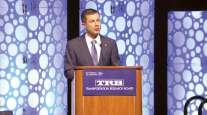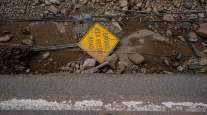Senior Reporter
Buttigieg Promotes Budget for DOT, Touts Infrastructure Plan

[Stay on top of transportation news: Get TTNews in your inbox.]
The Biden administration’s proposal to increase funding for operations at the U.S. Department of Transportation would enhance the flow of commerce and respond to concerns linked to climate change, Secretary of Transportation Pete Buttigieg told House lawmakers April 15.
Ahead of the chamber’s consideration of a multiyear highway policy bill, Buttigieg pointed to myriad potential benefits that he said would stem from President Joe Biden’s fiscal 2022 budget request for USDOT.
Separately, the White House also is asking for passage of a multitrillion dollar infrastructure package.
Under the president’s budget blueprint for fiscal 2022, released this month, the department would receive a 14% increase in funding, and a new strategy for addressing climate change. The White House intends to unveil a detailed budget request to Congress in a few weeks.
The funding request is a tool meant to assist members of Congress tasked with crafting a funding bill for USDOT.
As part of the budget request, the department would receive $25.6 billion, about $300 million above the fiscal 2021 enacted level. The budget also proposes $625 million for a passenger rail competitive grant program, and $375 million for Consolidated Rail Infrastructure and Safety Improvement, or CRISI, grants. It would provide $2.5 billion for a transit grants program, and $250 million in grants for transit agencies to purchase low- and zero-emission buses.
The Rebuilding American Infrastructure with Sustainability and Equity, or RAISE, grants, formerly known as the Better Utilizing Investments to Leverage Development, or BUILD, grants, would receive $1 billion. Additionally, the request would provide the U.S. General Services Administration $300 million for new electric vehicles and charging stations.
Separate from the fiscal 2022 budget, Buttigieg touted the president’s $2.25 trillion infrastructure plan, referred to as the American Jobs Plan, suggesting its enactment would lead to improvements across every corner of the transportation landscape. The infrastructure plan calls for $115 billion for highways and bridges, $85 billion for transit, $80 billion for Amtrak, $25 billion for airports and $17 billion for inland ports. It would be funded by raising the corporate tax rate to 28% from the current 21%.
“The American Jobs Plan will modernize how we travel, how we move goods and how we live. It would make transformative investments, turning shovel-worthy ideas into shovel-ready projects and seeing them to completion. It would support millions of new good jobs, the majority of which would be available to Americans without a college degree,” Buttigieg said.

Price
Rep. David Price (D-N.C.), chairman of the House transportation funding committee, cited the American Society of Civil Engineers’ review of the country’s infrastructure system, in which the group called for trillions of additional dollars to repair transportation grids: “The American Jobs Plan combined with the president’s budget request would move us substantially toward that investment,” Price said.
Several lawmakers, such as Transportation and Infrastructure Committee Chairman Peter DeFazio (D-Ore.), have suggested the potential for considering proposals that would modernize freight and commuter corridors. On April 14, the panel met to consider transportation projects from colleagues in the chamber.
“It has become even more clear that communities across the country, both urban and rural, need transformational infrastructure investments to improve the lives of all Americans,” said DeFazio. “By modernizing our infrastructure, we can create millions of jobs, become more competitive in the global economy, make transportation more affordable and equitable, create more livable communities, and reduce carbon pollution from the transportation sector that is driving the climate crisis.”
Transportation policymakers have yet to agree on a sustainable source of funding for the highway policy legislation. Funding the highway legislation would necessitate either boosting the Highway Trust Fund or identifying alternative funding sources. The trust fund’s reliance on revenue from fuel taxes is insufficient for meeting its obligations to state agencies.
Meanwhile, a group of Republican senators said they plan to present an infrastructure funding proposal that would cost about $800 billion. GOP leaders have pushed back on Biden’s infrastructure plan, arguing it would be costly and would hinder the economy by rolling back Trump-era corporate tax cuts.
“President Biden has proposed a type of pay that I cautioned against in the past,” said Sen. Shelley Moore Capito (R-W.Va.), Senate transportation committee ranking member. “I am concerned about the effect that the tax increases proposed by the administration will have on our nation’s economic growth, particularly coming out of this pandemic.”
House funding leaders have yet to schedule consideration of the president’s budget request. The transportation policy panel, however, intends to consider a comprehensive highway bill as early as May. The legislation would update the country’s premier surface transportation law, known as the FAST Act.
Want more news? Listen to today's daily briefing below or go here for more info:




